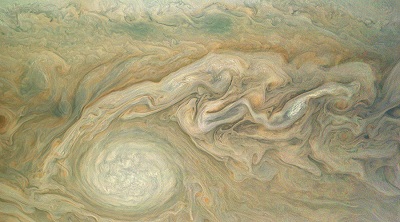NASA’s Juno spacecraft collected more crucial data during its latest flyby of Jupiter, the probe’s fifth science orbit since beginning its monumental mission.
Juno’s many onboard instruments collected various forms of data during the close flyby. These readings will be returned to Earth for analysis along with images captured by the spacecraft’s JunoCam, according to RT.
The spacecraft got closest to the center of the gas giant at about 2,200 miles (3,500km) above Jupiter’s “mysterious cloud tops” – the secrets of which, NASA believes, the flyby will help reveal.
During the last flyby, the JunoCam captured a stunning close-up image of Jupiter’s swirling clouds. However, the mis-shapen edge to the photo alarmed some observers. NASA then explained that the camera is sometimes too close to the planet to capture the entire illuminated area in one image, meaning the sides get cut off.
Juno, a $1 billion spacecraft, has logged an incredible 63.5 million miles (102 million km) in Jupiter’s orbit since it arrived on July 4, 2016, five years after launching from Cape Canaveral, Florida.
 The spacecraft’s mission is to plunge beneath the swirling clouds that shroud the planet to collect groundbreaking information about Jupiter’s origins, structure, atmosphere and magnetosphere.
The spacecraft’s mission is to plunge beneath the swirling clouds that shroud the planet to collect groundbreaking information about Jupiter’s origins, structure, atmosphere and magnetosphere.
piter’s next flyby will take place on July 11, when it will soar over the planet’s ‘Great Red Spot’, a gigantic high pressure zone twice the size of Earth. The area has hosted a constant anticyclonic storm for hundreds of years.
H.Z

